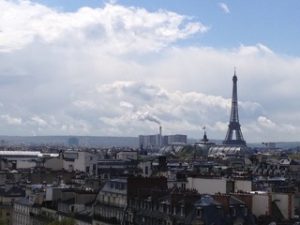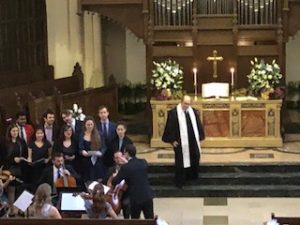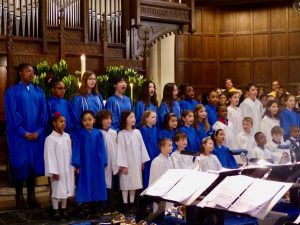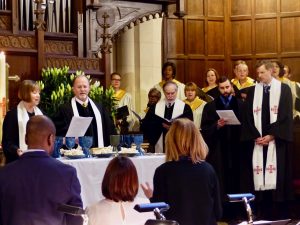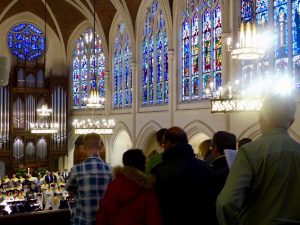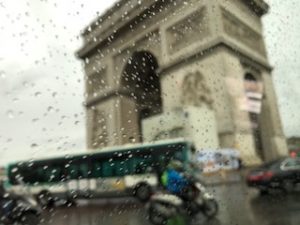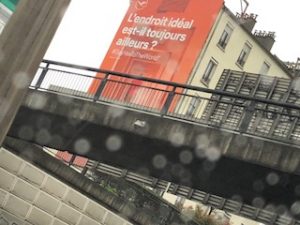FEAR NO EVIL
Psalm 23
John 10: 11-18
The Reverend Odette Lockwood-Stewart
The American Church in Paris
2018
We are all afraid… of something.
Every beloved child of God that has been hurt, oppressed, tossed aside or turned against, has been afraid.
Every one listening to the bad news sold by media and forecast by fearmongering politicians has been afraid.
What frightens you? What keeps you awake at night?
What fears tug at your heart when you say goodbye to loved ones? What worries do you carry into an unknown or uncertain future? Which news headlines and daily realities make you anxious?
We are all afraid… of something.
Is there anyone here today who has never had one moment of fear in your life…? Aha! Not a one. Now we can have some very interesting conversations at coffee fellowship.
As for myself, I am well acquainted with fear. For example, I know that I could never be a character in a horror film because I would neveropen that creaking door, or climb down into a dark basement, or follow a trail of bloody footprints into the woods as the scary music gets louder … Never. Indeed, I have such an active imagination and I am so well acquainted with fear that I would love to have back just some of the time in my life that I’ve spent afraid of things that didn’thappen.
As a child, I lived in a real life scary world. I grew up in a family where there was a lot of love, but far from perfect love, in which violence could erupt at any moment. As children often do, I somehow thought that I was responsible for my father’s drinking and anger. One night, when I was very young and very afraid, I heard the voice of God. I was hiding in the bathroom, seeking refuge, rocking, crying, and repeating over and over again a scripture-based prayer I had learned, “Lord I am not worthy that you should come under my roof. Speak but the word and my soul will be healed. Lord I am not worthy that you should come under my roof. Speak but the word and my soul will be healed.” Then, I heard, I felt, a gentle, clear voice say, “I said it already! Don’t be afraid.”
You may already know that the command most often repeated in the Bible after “Praise Ye the Lord” is “Fear not!” “Do not be afraid!” In many forms andhundreds of times. God knows we need to hear that message every day. Rabbi Abraham Heschel in his great work, The Prophets, wrote, “The things that horrifythe prophets are even now daily occurrences all over the world.”
Wars … rumors of wars … famine … fires … floods … the poor trampled by the rich…
We also carry fear-full times “inside” … You may be walking through the valley of the shadow of death now….
Fear is a natural response and canhelp keep us alive. We even instill fear in children to keep them safe from dangers. Hot stoves … electrical outlets … street traffic … strangers … Fear can promote legitimate caution. But fear can also paralyze us, cause us to do harm to ourselves and others, and keep us from abundant life.
One physiological fear response is “fight or flight.” The heart speeds up, we hold our breath – or hyperventilate, we shake, mouth gets dry, adrenalin pumps through our bodies, digestion stops. This response also includes – tunnel vision and hearing loss! When we are afraid, our vision narrows and our hearing is weakened. Nevertheless, if we are centered, grounded… in a higher power…, if we are loved into vision of a bigger frame…, we can trust a wider vision than we can see, a deeper song than we remember. As Christians, we know this in the power of God’s love in Jesus Christ, the Good Shepherd.
Today is the fourth Sunday of Easter, known as “Good Shepherd Sunday.” Our readings remind us that the comfort and courage we find with the Good Shepherd can free us to open our hands and hearts in loving service even when we are most afraid. The Lord is my shepherd… and Jesus says, I am the Good Shepherd….
These texts and truths touch our hearts – center our souls – in the absolute trustworthiness of God.
The 23rdpsalm is often memorized, sung at memorials, held close in times of crisis. It is also a psalm for everyday, a song of confidence in the clash of hopes and fears. Every daywe can choose to displace and replace fear by remembering and resting in God’s love. I John 4:18: “There is no fear in love, but perfect love casts out fear.”
To say “the Lord is my shepherd”is to say that Godis the one to whom I look in every circumstance for nourishment, guidance and care. God is shepherd and host. Psalm 23 reminds the people of Israel that God’s love was enough to deliver them from slavery, enough to sustain them in the wilderness.
Nelson Mandela, the late anti-apartheid leader and president of South Africa, who was imprisoned for twenty-seven years, wrote these words of encouragement to others, “May your choicesreflect your hopes and not your fears.”
Scripture encourages us, to make choices that reflect God’s love and not our fears. In hopeless situations, the hope is not in the situation, it is in us, by the grace of God.
As most of us are not as familiar today with sheep and shepherds as King David was 3000 years ago, or Jesus’ followers were 2000 years ago, I read reports from several shepherds about… sheep.
Spoiler alert: Sheep, while beautiful useful beings, are also creatures with destructive habits, who will not rest, who do not follow, and who wander, a lot.
Second spoiler alert: We are the sheep.
Sheep are creatures of habit.They follow and feed on the same paths until the ground becomes barren and polluted… (climate change!) the Shepherdleads sheep onto new and life-giving paths. On this Earth Day, I am inspired by many new and life-giving paths engaged by tens of thousands in the Canopy Project, working to plant 7.8 billion trees for reforestation – one for each person on earth. Habits can change.
Sheep will not rest if they are anxious, hungry, or in conflict…(I cannot rest if I am anxious, hungry or in conflict) Shepherds protect their sheep from floods, storms, heat, hunger, robbers, and wild animals. The shepherd makesthe sheep lie down in pastures of tender grass and rest safelybeside still waters. On this Lord’s day, I am inspired by movements in the church to recreate sabbath space in our lives – honoring one day each week to rest in right relationship with God and one another. Sheep can rest.
Sheep do not easily follow. Yet every day the shepherd’s voice, known and trusted, encourages those who are struggling or straggling, as he tends those who are injured or sick, and guides those who cannot find food. Sheep know as they are known and trust the one who cares for them.
Sheep wander. The prophet Isaiah said,“All welike sheep have gone astray” (53:6). The shepherd continually guidesthe sheep back to the right path. If the shepherd loses one sheep, he will go out and search until he finds and brings it home. The shepherd uses the rod to fight off predators, but the staff hooks and guides the sheep themselves. Atnight when the sheep are gathered in a pen, the shepherd lays his own body down on the ground across the opening in the fence, to keep the sheep in and danger out.
We listen for the voice of the “good shepherd.”
While Jesus’ love does not take away all threats, he lays down his life for the sheep. (This phrase occurs five times in just nine verses). and picks up his life again for his flock. One Shepherd. One flock. And Jesus’ flock includes those beyond this fold and beyond our imagining.
The dangers of powers, principalities, and profiteers threaten. Sad to say even parents, pastors, police can be hirelings or predators. Hirelings are those who are supposedto shepherd but who run when the wolves appear, predators are wolves in sheep’s clothing.
Jesus said, “My sheep hear myvoice. I know them, and they follow me. I give them eternal life, and they will never perish. No one will snatch them out of my hand.” Listening to Jesus’ voice, we know as we are known, we love as we are loved.
“Yea, though I walk through the valley of the shadow of death, I will fear no evil, for you are with me….”
Psalm 23 does not say that evil and death do not exist. We face our fears and cross valleys because we know we are not alone, and because we rest inand live fromGod’s love.
Psalm 23 does not say “I will not fear”, but rather “I will fear no evil.”
Fearing no evil means we do not let fear dictate who we are or how we live. The greatest power we have is the power to choose to whom and to what we will give the power to define who we are. We fear no evil because we give that power to God alone.
We testify in the face of evil, “The Lordis my shepherd. Youare not.”
On the 19thanniversary of the school shooting in Columbine, Colorado, I am inspired as young people (and adults) across the United States continue to grow movements to end all Gun violence in everycommunity. Gun violence claims 33,500 lives every year. 2/3 of these are suicides. They are all our sons, daughters, brothers, sisters, fathers, mothers. Will fear of violence cause us to place our trust in guns? Or, will we listen to the voice of the Good Shepherd and trust the power of God’s love?
Think about your life. Your fears. They can entomb or they can awaken you to trust ever more deeply. There is no pit so deep God’s love is not deeper still.
The amazing Good News of Easter is that even and especially in fear-full situations we can be led to new life. As we practice placing our trustin Christ,living love in the face of evil, andlistening to the voice of Godwe are Easter people.
EverLiving Lord, speak your Word through our words, love your world through our lives, take our hearts and set them on fire with praise all our days. Amen

